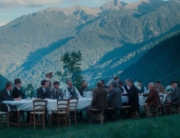Alicia Scherson’s impressive piece third feature-length film centers around two teenage siblings, Thomas (Luigi Ciardo) and Bianca (Manuela Martelli). As the eldest, she must take the reins as matron of the household after their parents die in a car crash.
Though the film is based in Rome and a majority of the dialogue is in Italian, there is a strange quadrangle of references to Chile, both internally and externally to the film. Externally, Scherson and Martelli are both Chilean, as well as Roberto Bolano, writer of the source novel. Within the film, there is mention that the siblings have no family other than some distant relatives in Chile. I wasn’t quite sure of the significance initially, but it may have been a reference to the cultural heritage surrounding the movie. It is also an answer to my bewilderment at why Martelli spoke perfect Italian as Bianca, but when she spoke English she had a South American accent. Nothing a little research didn’t clarify.
After Bianca drops out of high school to work at a hair salon, she slowly loses control of her household to a pair of hulking personal trainers from a nearby gym where Thomas begins hanging out. The men ease themselves into Bianca and Thomas’s life, first preparing meals for the siblings, taking Thomas under their wing, and briefly seducing Bianca. They eventually unfurl a plan for Bianca to woo a former movie star, Miciste (played by an unassailably charming Rutger Hauer), who lives in a nearby mansion, and eventually gain his trust and rob his supposed safe.
As one could guess, Bianca develops feelings for the aged star and finds herself at a moral fork: to go through with the original plan or abandon it. Despite the easy road to a predictable tearjerker, Scherson provides the viewer with tepid, realistic resolutions. I say tepid in a positive way, as it more accurately mirrors reality. Take, for instance, the unwanted houseguests. At once, they seem ominous and truly threatening, and the viewer expects a violent climax between them and the siblings. Yet the script fortunately deprives us of this cheap thrill and instead reveals the men for what they are: low-life thugs with no power. They reflect the impotence within poverty, and that’s about as far from a Hollywood hook as you can get. I praise such an approach as a critique of my own innate desire for a dramatic climax: a brawl, a death, an elopement…this was simply not pandered to.
Il Futuro spares the viewer of those clichés, and yet possesses far more complexity than a gritty, uber-realist film. It has visual and thematic references to magical realism, as Thomas and Bianca would casually discuss supernatural events, and drifts in and out of subtle dream sequences. There is a play on light and dark that supplement the dream-like quality of Bianca’s mundane life. She is depicted either in a veil of soft light or the confines of her black room, the void punctuated only with the cherry of a lit cigarette.
The film deals with other dichotomies in a clever, less stark manner. The opening sequence follows a car traversing a winding road, while the next scene brings us to an impound lot for wrecked cars. The location is another tenuous metaphor; all the glory of the Roman Empire is cut down ruggedly with the seedy underbelly of the city’s crime , poverty, and banality. A shot of the cityscape is immediately followed by a kitsch ashtray in Bianca’s house in the likeness of none other than the Coliseum. These visual motifs allude to the fall of not only Bianca’s world, but that of Miciste’s career as well.
Aside from the contradictions at play, the performances imbued the film with depth. Martelli is subtle, but perfectly cast. Rutger Hauer ventures into caricature-ism at times with his rugged, mysterious, old-timer archetype, but was overall satisfactory. I’d certainly give this film a chance.

















Leave A Comment